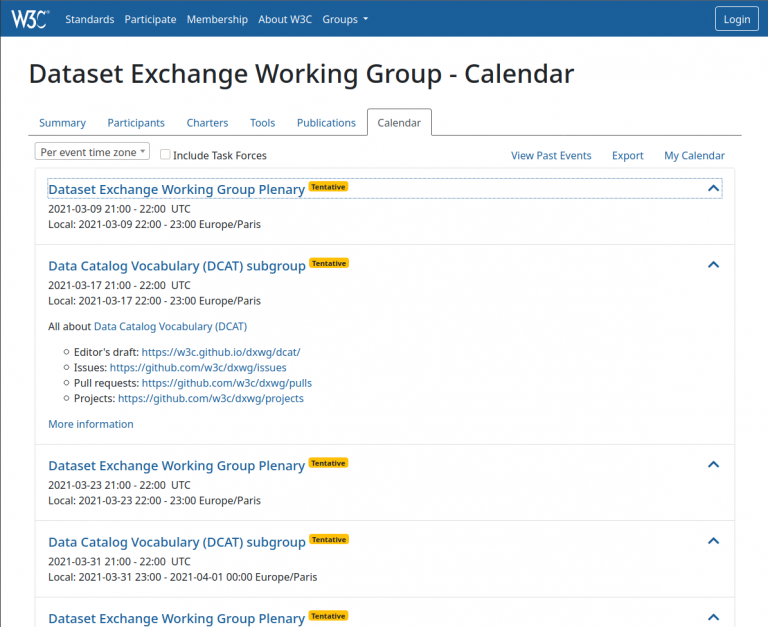News
W3C Strategic Highlights, April 2021
30 April 2021 | Archive
![]() Today W3C released to the public the April 2021 edition of our W3C Strategic Highlights which documents the tremendous work to enhance, grow and strengthen the Web platform, and how the Web Consortium meets the needs of industry and society as a whole.
Today W3C released to the public the April 2021 edition of our W3C Strategic Highlights which documents the tremendous work to enhance, grow and strengthen the Web platform, and how the Web Consortium meets the needs of industry and society as a whole.
At the same time, as we celebrate the anniversary of the release of the World Wide Web into the public domain on 30 April 1993 by CERN, our CEO Jeff Jaffe has published his reflections on the centrality of the Web Consortium as the Web has been accelerating to meet society’s needs, and on the importance of the Web infrastructure in the modern world.
Human civilization is at an extraordinary juncture. The Web Consortium is in an incredible position to host the open forum where diverse voices from different parts of the world come together to incubate and build the global standards for the Web in the 25 years to come.
Upcoming: W3C Workshop on Smart Cities
9 April 2021 | Archive
 W3C announced today the W3C Workshop on Smart Cities, which is being organized as a virtual event on 25 June 2021.
W3C announced today the W3C Workshop on Smart Cities, which is being organized as a virtual event on 25 June 2021.
The goals of the workshop are:
- Identify stakeholders of Smart Cities standardization to drive the development of Web standards aligned with the real needs of Smart Cities
- Clarify reasonable applications for Smart Cities technologies we agree to build
- and then see how to improve the draft Charter for the potential Smart Cities Interest Group for further discussions within that IG
Possible topics for the workshop may include:
- Summary of the current status of Smart Cities
- Needs for Web-based Smart Cities of the stakeholders including the users, the developers and the governments
- Cross-cutting issues for integration of multiple sub-systems
The event will be organized as a combination of pre-recorded talks followed by a series of live sessions on 25 June. The event is free and open to anyone with relevant perspectives on the topic to register for the event. For more information on the workshop, please see the workshop details.
Deadline to submit a proposal for a talk is 30 April 2021, and registration is open through 18 June.
Working Group Note: Making Content Usable for People with Cognitive and Learning Disabilities
30 April 2021 | Archive
The Accessibility Guidelines Working Group (AG WG) and the Accessible Platform Architectures (APA) Working Group have published the Working Group Note “Making Content Usable for People with Cognitive and Learning Disabilities” from the Cognitive and Learning Disabilities Accessibility Task Force (COGA). This document helps make web content, including applications, meet the needs of people with cognitive and learning disabilities. It covers aims and objectives for usable content; design patterns (ways) to make content usable; including users in research, design, and testing activities; personas; and user needs. The document provides informative "supplemental guidance" beyond the requirements of WCAG 2. It is not required for conformance to WCAG. We welcome comments for the next version of this document. To learn about W3C work on accessibility for people with cognitive and learning disabilities, see: Cognitive Accessibility at W3C.
First Public Working Draft: Web Authentication: An API for accessing Public Key Credentials Level 3
27 April 2021 | Archive
The Web Authentication Working Group has published a First Public Working Draft of Web Authentication: An API for accessing Public Key Credentials Level 3 today. This specification defines an API enabling the creation and use of strong, attested, scoped, public key-based credentials by web applications, for the purpose of strongly authenticating users. This document is a straight lift of WebAuthn Level 2 Recommendation, preparing for updates to come.
EMVCo, FIDO Alliance, and W3C Renew Commitment to Enhance Security and Interoperability of Web Payments
19 April 2021 | Archive
The FIDO Alliance, EMVCo, and W3C announced today the renewal of the Web Payment Security Interest Group, to continue to enhance the security and interoperability of various Web payments technologies. The group participants will continue to define areas of collaboration and identify gaps between existing technical specifications in order to increase compatibility among different technologies.
See the Web Payment Security Interest Group Charter for more information, and read more in the EMV® Insights Post.
First Public Working Drafts for WebCodecs
8 April 2021 | Archive
The Media Working Group has published a First Public Working Draft of WebCodecs today. The specification defines interfaces to codecs for encoding and decoding of audio and video. It does not specify or require any particular codec or method of encoding or decoding but provides JavaScript interfaces to implementations of existing codec technology developed elsewhere. Implementers may support any combination of codecs or none at all.
Alongside this main specification, the Media Working Group also published two First Public Working Drafts to establish a registry for WebCodecs:
- The WebCodecs Codec Registry is intended to enhance interoperability among implementations and users of WebCodecs. In particular, this registry provides the means to identify and avoid collisions among codec strings and provides a mechanism to define codec-specific members of WebCodecs codec configuration dictionaries.
- The AVC (H.264) WebCodecs Registration is the first entry in the registry. It describes, for AVC (H.264), (1) the fully qualified codec strings, (2) the
VideoDecoderConfig.descriptionbytes, and (3) the codec-specific extensions to theVideoEncoderConfig.
A calendaring tool is now available for W3C groups
16 March 2021 | Archive
 Today we announced the Beta of a group calendaring service, developed by the W3C Systems Team. The tool aims to help W3C Groups schedule their meetings and share them with the W3C community. A new “Calendar” tab is now available from our group pages, lists all upcoming meetings a given group has scheduled, and enables in particular viewing times in different time zones (including your own), exporting and subscribing to an iCal feed.
Today we announced the Beta of a group calendaring service, developed by the W3C Systems Team. The tool aims to help W3C Groups schedule their meetings and share them with the W3C community. A new “Calendar” tab is now available from our group pages, lists all upcoming meetings a given group has scheduled, and enables in particular viewing times in different time zones (including your own), exporting and subscribing to an iCal feed.
This has been a long-standing request from W3C Groups to manage calendars of events, subscribe to them as well as easily view them on the Web, thus facilitating participation in, and scheduling of group meetings. You can read more in Jean-Gui Rouel’s blog posts about the tool’s discovery phase and about functionalities and future roadmap.
Talks and Appearances 
-
2021-05-06 (06 MAY)
-
2021-05-18 (18 MAY)
Events 
-
2021-05-16 (16 MAY) – 2021-06-10 (10 JUN)
-
2021-06-25 (25 JUN)
Virtual Event



